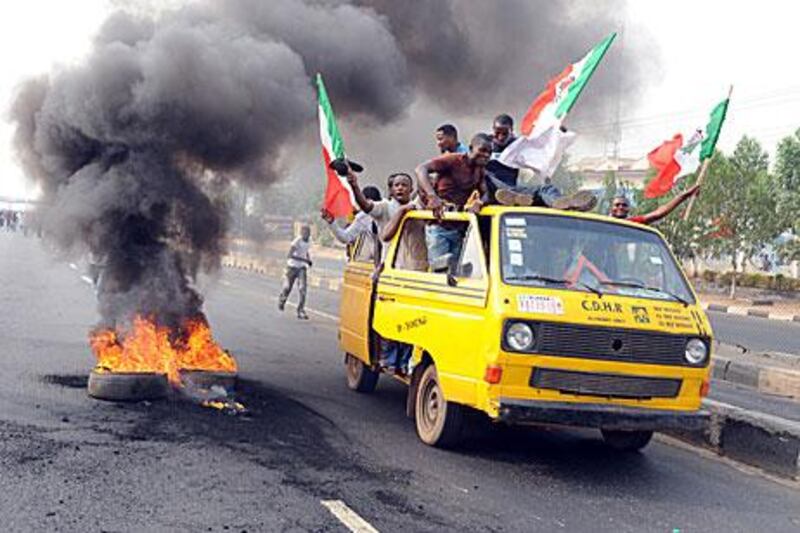ABUJA // The Nigerian president, Goodluck Jonathan, says the violent Islamist sect, Boko Haram, has supporters within his own government, and the danger the group has created is worse than during the 1960s civil war that killed more than a million people.
Mr Jonathan suggested that Boko Haram - which has been blamed for gun and bomb attacks across the country, most recently targeting Christians - had sympathisers at all levels of the government.
Meanwhile, a national strike paralysed much of Nigeria yesterday, with more than 10,000 demonstrators swarming its commercial capital of Lagos to protest soaring fuel prices and decades of government corruption. At least one person was killed in Lagos, and a mob pushed the body in a wheelbarrow down the street.
In the city of Kano, 18 people were wounded when security officers used tear gas and fired at a crowd protesting the fuel price hikes. Protesters in Lagos took gasoline from motorbikes to set tires ablaze. And some demonstrators waved placards bearing an effigy of Mr Jonathan with devil horns and fanged teeth, and showing him pumping fuel at a gas station.
"Our leaders are not concerned about Nigerians. They are concerned about themselves," said protester Joseph Adekolu, a 42-year-old accountant. Police carrying Kalashnikov rifles and gas masks in Lagos largely stood by as the demonstrators marched on the first day of an indefinite strike called by labour unions. Protesters also took to the streets in Nigeria's capital of Abuja.
On Sunday at a church service in Abuja, Mr Jonathan warned of the growing influence of Islamist extremists in his government.
"Some of them are in the executive arm of government, some of them are in the parliamentary/legislative arm of government, while some of them are even in the judiciary," he said.
"Some are also in the armed forces, the police and other security agencies. Some continue to dip their hands and eat with you and you won't even know the person who will point a gun at you or plant a bomb behind your house," he said.
Mr Jonathan declared a state of emergency in the north-east and two other regions of Nigeria on December 31, trying to contain the growing insurgency by Boko Haram, which says it wants to apply Sharia across the country.
It claimed responsibility for a series of bomb attacks across Nigeria on Christmas Day, including one at a church near Abuja that killed at least 37 people and wounded 57.
Jonathan told the service that the secretive nature of the group in some ways makes it worse than anything seen during the civil war, which broke out in 1967 when the Igbo people of Nigeria's south-east declared their home region the independent Republic of Biafra.
Three years of fighting killed more than million people, many of them from starvation.
"The situation we have in our hands is even worse than the civil war that we fought. During the civil war, we knew and we could even predict where the enemy was coming from," he said. "But the challenge we have today is more complicated."
Jonathan's comments reflect the popular view that Boko Haram - a sect styled on the Taliban whose name means "Western education is forbidden" in the northern Hausa language - is sponsored by some northern politicians.
As the insurgency has moved out of its heartland in remote northeastern Nigeria, it has increasingly struck at targets that seem designed to fracture Nigeria's tense divide between its largely Muslim north and its predominantly Christian south.
More than 500 people were killed in post-election violence in the north after Mr Jonathan's victory, reflecting long-standing northern grievances about perceived alienation and exclusion by the central government from the fruits of national oil riches.
Hundreds of Christians have begun to flee northern Nigeria after dozens were killed in a series of attacks by Islamist militants who issued an ultimatum to southerners and Christians to leave the mainly Muslim region or be killed.
* Reuters and Associated Press





